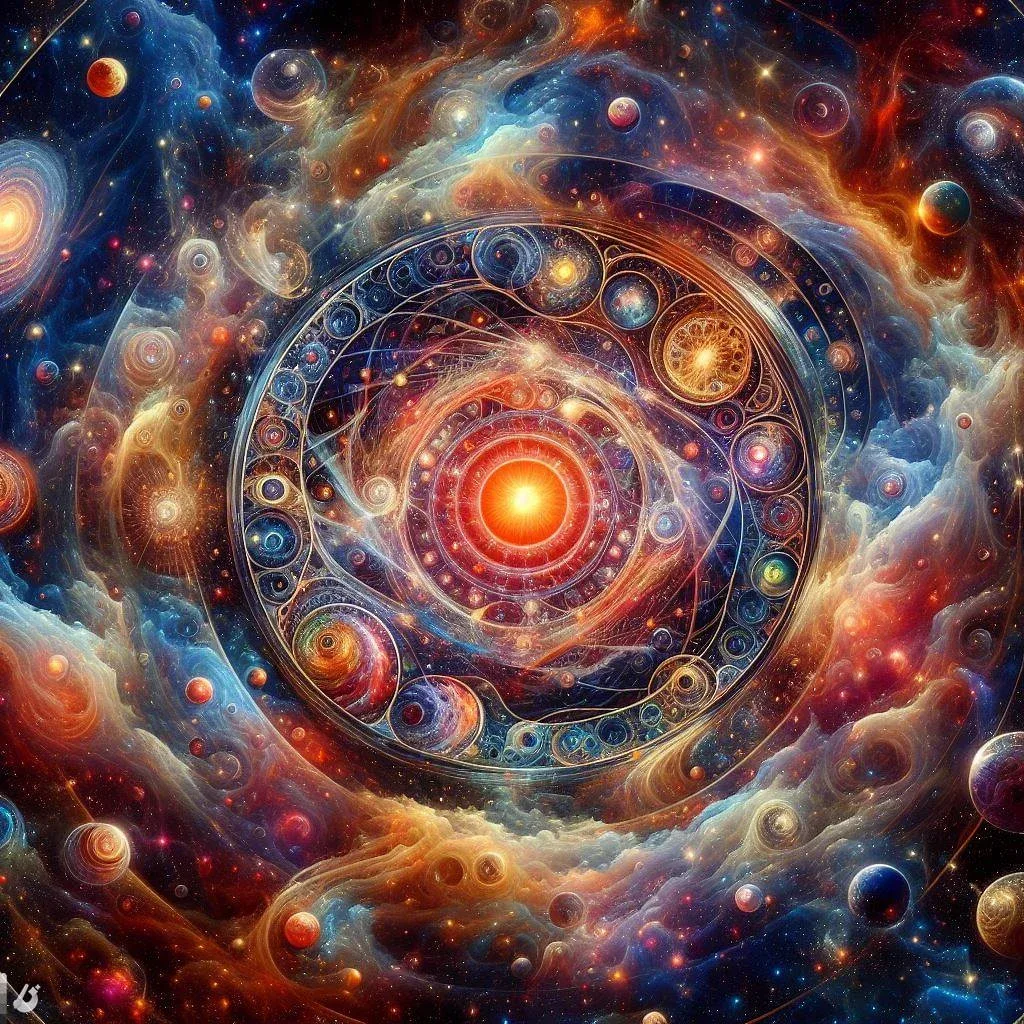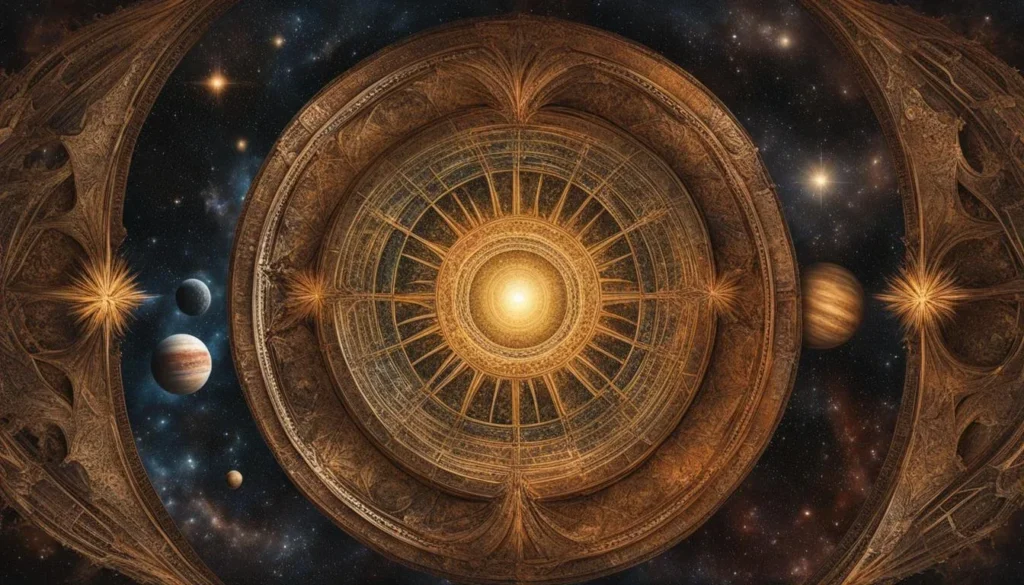A stoic philosophy It's a fascinating perspective that offers a unique insight into the cosmos and our own existence. Based on the teachings of Stoic philosophers such as Zeno of Citium e Theseus of Ticia, stoic cosmology explores topics such as cosmogony, stoic beliefs, stoic virtue, stoic ethics and stoic logic. In this article, we will delve into the universe of stoic cosmology, exploring his main ideas and how they can enrich our understanding of the world.

Main points:
- A stoic philosophy offers a fascinating insight into the cosmos and human existence.
- Zeno of Citium e Theseus of Ticia are important Stoic philosophers.
- A stoic cosmology explores themes such as cosmogony, virtue, ethics and stoic logic.
- Stoic cosmology can enrich our understanding of the world and guide us to a fuller life.
The Foundations of Stoic Cosmology

In Stoic cosmology, it is believed that the cosmos is governed by a rational order and that everything in it is interconnected. A stoic virtue plays a fundamental role in this worldview, being seen as the key to living a full life in harmony with the universe. A stoic ethics emphasizes the importance of cultivating virtues such as wisdom, courage, justice and temperance to achieve happiness and personal fulfillment. Furthermore, Stoic logic is used as a tool for understanding and dealing with life's challenges, helping to develop clear and rational thinking.
The Importance of Stoic Virtue
In Stoic cosmology, virtue is seen as the only true good. The Stoics believed that living in accordance with the rational nature of the universe is fundamental to achieving happiness and personal fulfillment. Cultivating virtues such as wisdom, courage, justice and temperance is essential to living in harmony with the order of the cosmos. A stoic virtue not only benefits the individual, but also contributes to the well-being of the community as a whole.

For the Stoics, ethics is inseparable from virtue. A stoic ethics values self-discipline, self-control and acceptance that some things are beyond our control. By focusing on what we can control – our own attitudes and actions – we can achieve a virtuous life in harmony with the universe. Stoic logic plays an important role in this process, helping us develop clear, rational thinking that allows us to better understand the world and make responsible decisions.
In short, Stoic cosmology teaches us that the cosmos is governed by a rational order and that living in harmony with this order is essential for a full and virtuous life. Stoic virtue, ethics, and logic are the foundations of this worldview and offer us guidance for dealing with life's challenges and achieving happiness and personal fulfillment.
Stoic Cosmogony: The Origin of the Universe

In Stoic cosmology, it is believed that the cosmos is governed by a rational order and that everything in it is interconnected. A stoic cosmogony is a theory that explores the origin and nature of the universe. Second Zeno of Citium, one of the main Stoic philosophers, the universe is formed by a unique substance called logos. This substance permeates the entire cosmos and is responsible for its existence and order. The vision of stoic cosmogony It has profound implications for understanding our own existence and role in the world.
According to stoic cosmogony, the universe is cyclical, going through repeated cycles of destruction and renewal. This process is called “ekpyrosis”. During the destruction of the universe, everything returns to the primordial substance, the logos. Then the logos expands and transforms again into a new cosmos, beginning a new cycle of existence. This cyclical view of the cosmos reflects the Stoic belief that everything in life follows a pattern and that we must accept changes and transformations as a natural and inevitable part of the universe.

Stoic cosmogony offers a unique perspective on the origin and nature of the universe. This vision invites us to reflect on our own existence and reconnect with cosmic order and harmony. By understanding Stoic cosmogony, we can develop a greater appreciation for the world around us and a deeper understanding of our connection to the cosmos.
The Table of Stoic Cosmogony
| Phase | Overview |
|---|---|
| Logos | The unique substance that permeates the entire cosmos and is responsible for its existence and order. |
| Ekpyrosis | The process of destruction of the universe, where everything returns to the primordial substance. |
| Renovation | The logos expands and transforms into a new cosmos, beginning a new cycle of existence. |
Quote:
Stoic cosmogony invites us to reflect on our own existence and reconnect with cosmic order and harmony.
Stoic Virtue and the Ethics of Stoic Cosmology
Stoic virtue plays a central role in Stoic ethics and the Stoic worldview as a whole. The Stoics believed that virtue is the only true good and that well-being and happiness can be achieved through the cultivation and practice of virtues, such as wisdom, courage, justice and temperance.
Stoic ethics value self-discipline, self-control, and the understanding that we cannot control external events, only our own response to them. This ethical approach is closely linked to the Stoic view of the cosmos as a rational and harmonious order. Through the cultivation of Stoic virtue, we are encouraged to live in accordance with the nature of the universe and develop a balanced and serene view of life.

Stoic ethics challenge us to question and reevaluate our own beliefs and behaviors, seeking moral excellence in everything we do. By practicing stoic virtue, we learn to accept what we cannot change, to find serenity in the midst of adversity, and to act with integrity and justice. These ethical principles help us face life's challenges, make wise decisions, and live according to our deepest values.
In short, Stoic virtue and the ethics of Stoic cosmology invite us to pursue moral excellence and live in harmony with the natural order of the universe. By cultivating virtues such as wisdom, courage, justice and temperance, we become better human beings and find greater personal fulfillment. Stoic ethics provide us with a framework for living a meaningful and authentic life, in tune with the universal principles of reason and virtue.
Conclusion
Stoic cosmology offers a fascinating perspective on the cosmos and our own existence. When studying the stoic philosophy, we find wisdom and guidance to deal with life's challenges, cultivate virtues such as courage and temperance, and seek personal fulfillment. Stoic philosophy reminds us of the importance of living in accordance with the nature of the universe and cultivating a serene, balanced view of life.
By exploring Stoic cosmology, we pave the way for a journey of self-discovery and personal growth. Through the teachings of the Stoic philosophers, we can develop a deeper understanding of ourselves and the world around us.
Stoic philosophy, with its beliefs and principles, invites us to reflect on our existence and find meaning in our journey. By incorporating Stoic cosmology into our daily lives, we can seek inner peace, wisdom, and true happiness regardless of external circumstances.
FAQ
What is Stoic cosmology?
Stoic cosmology is a philosophical perspective that explores the rational order of the cosmos and the interconnectedness of all things in it. It offers a unique view of existence and seeks to understand the origin and nature of the universe.
What are the foundations of Stoic cosmology?
Stoic cosmology is based on the teachings of Stoic philosophers such as Zeno of Citium and Theseus of Ticia. She explores topics such as Stoic virtue, Stoic ethics, and Stoic logic, which play a fundamental role in this worldview.
What is Stoic cosmogony?
According to Zeno of Citium, one of the main Stoic philosophers, Stoic cosmogony is the theory that explores the origin and nature of the universe. She argues that the universe is made up of a unique substance called logos and that it goes through cycles of destruction and renewal.
What is the role of Stoic virtue in Stoic cosmology?
Stoic virtue plays a central role in Stoic ethics and the Stoic worldview as a whole. The Stoics believed that virtue is the only true good and that cultivating virtues such as wisdom, courage, justice and temperance is fundamental to achieving happiness and personal fulfillment.
Source Links
- https://estoicoviver.com/filosofia/filosofia-yanomami-conhecendo-a-cosmologia-e-a-cultura/
- https://tede2.pucrs.br/tede2/bitstream/tede/10820/2/Dissertação – Pedro Musella (versão final).pdf
- https://repositorio.ufmg.br/bitstream/1843/52048/4/As inspirações estoicas na filosofia da natureza e do conhecimento de Margaret Cavendish (repositório UFMG).pdf






